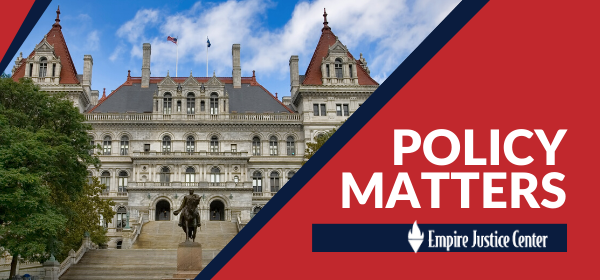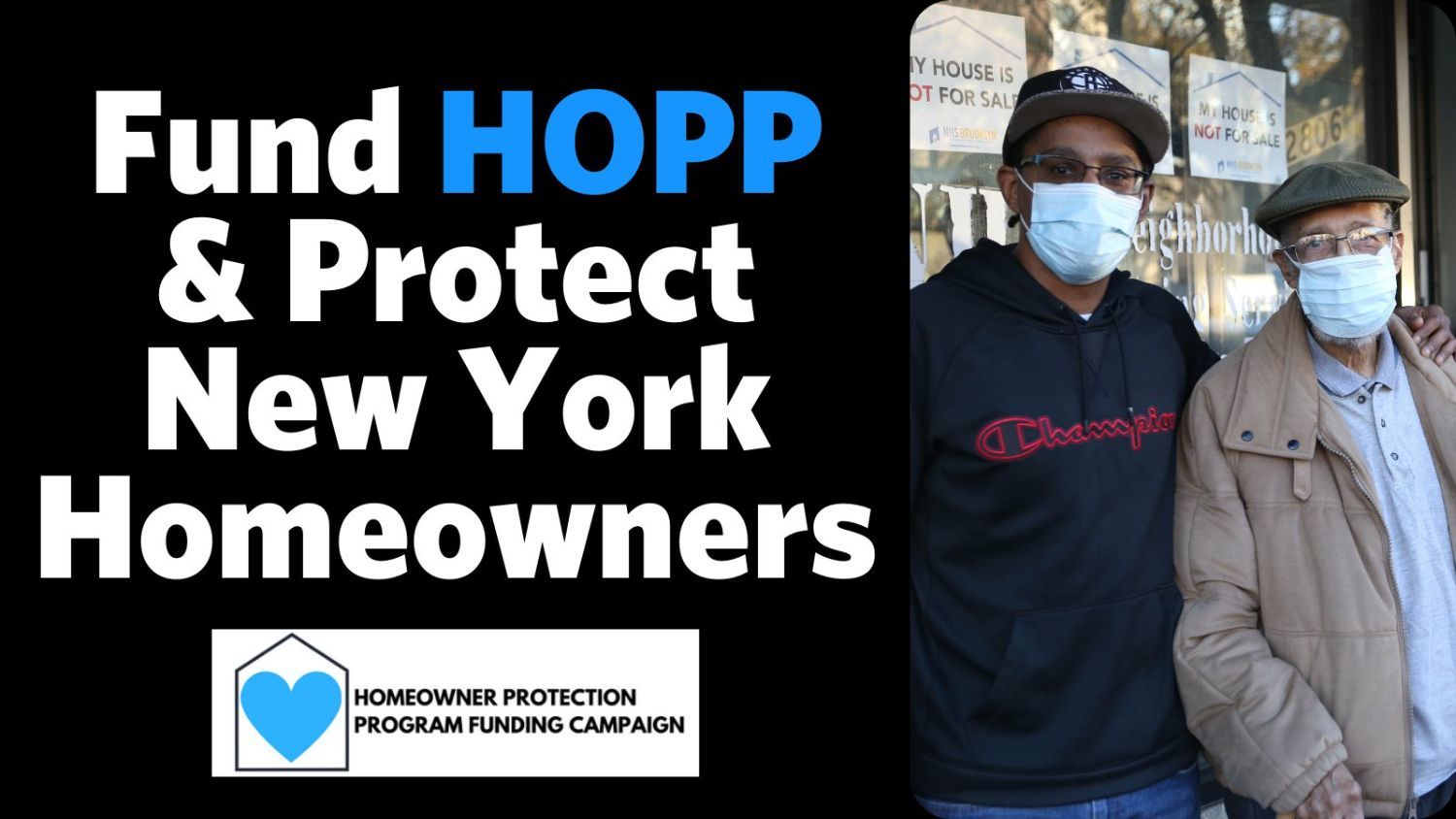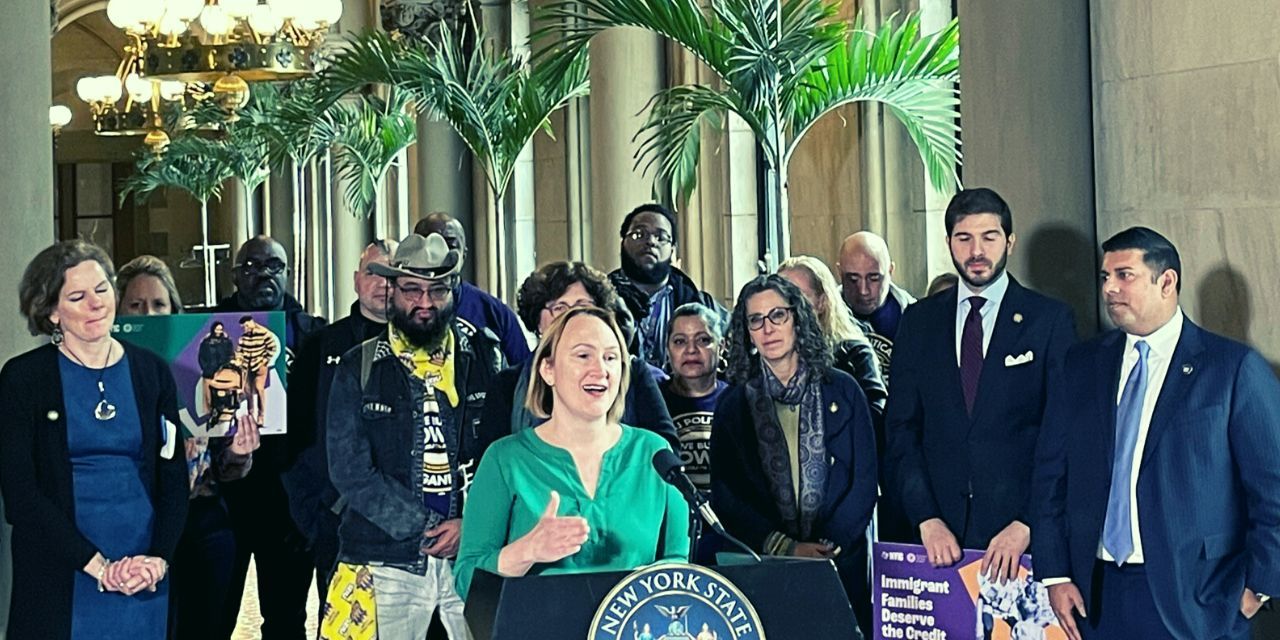| | |  | | Policy Matters - March & April 2023 Welcome to the combined March & April edition of our newsletter, Policy Matters. In this edition we cover the ongoing fight to fund foreclosure prevention; our push for solutions to benefits skimming to be included in this year’s state budget; continued advocacy for NYS tax credits for families; our work to support non-parent caregivers; continued work pushing for increases for the shelter and basic needs allowances; budget testimony on higher education, health, and housing; our support for moving on from outdated notarization practices; the need for more language justice in banking, an educational opportunity on how to reduce student loan debt; and appreciation for the appointment of Rowan Wilson as Chief Judge of the NYS Court of Appeals. You can also read on our website here. |
| |
|
|  | NYS Budget Talks Keep Going... But No Word Yet on Homeowner Protection While the Governor announced conceptual budget agreement last night, there has still been no confirmed deal guaranteeing full funding for the Homeowner Protection Program (HOPP). This important program has been providing free legal assistance to New Yorkers to avoid foreclosure since 2012 and has already helped over 120,000 New Yorkers avoid homelessness, crushing debt, and displacement. Last year Governor Hochul included HOPP funding in the Executive Budget for the first time, so its omission in this year’s Executive Budget has been especially striking and concerning to housing advocates and the public. We worked hard to push for inclusion of HOPP funding in the Governor’s 30 day amendments, but despite this, the funding was still absent when the 30 day amendments were released in early March. Our President & CEO Kristin Brown responded in a press statement: “By not funding the Homeowner Protection Program, Governor Hochul is putting is today’s struggling homeowners at risk, in favor of building new housing years from now. All but 2% of funds from last year’s budget will be spent by the time the existing contracts end. Make no mistake: New York homeowners will lose their homes without HOPP’s protection, which will have disastrous impacts for them, their families, and their communities.” Spectrum News covered the HOPP press conference at the NYS Capitol on March 22, which was attended by legislators such as Assembly Housing Chair Linda Rosenthal and Senate Housing Chair Brian Kavanaugh, along with advocates and members of the public to push for the inclusion of HOPP funding in the final budget. “What’s the sense of building more homes when you’re going to lose many more before you even get to the first stick in the ground,” state Assembly Member Linda Rosenthal said. “We do not want to neglect the homeowners in this state," state Senator Brian Kavanagh said. "Homeownership has been a way for people build wealth and build equity for generations.” City Limits also published a story on this issue in early March: In ‘Year Of Housing,’ Hochul’s Budget Leaves Out Anti-Foreclosure Program, which interviewed our Senior Staff Attorney Kirsten Keefe, along with other advocates. Kirsten praised a number of the Governor’s other housing proposals, such as the Homeowner Stabilization Fund, which will und home repairs in 10 areas of the state with high concentrations of low-income homeowners of color, and the Homeowner Assistance Fund, or HAF which can help homeowners pay property taxes, water bills, mortgage delinquencies and coop and condo fees. However, as Kirsten points out, “These [HOPP] agencies, and primarily the housing counseling agencies, are the ones who meet with homeowners and help them apply” to these types of programs, along with all the other work HOPP advocates engage in to keep people from losing their homes. It’s clear that HOPP remains an essential tool to improving housing access in New York State, and must be included in the final budget. |
| |  | Time Running Out to Protect New Yorkers from Skimming Scams Time is also running out to address the issue of benefits skimming – a practice by which scammers install a card reading device at point-of sale terminals to steal users’ account information, SNAP benefits, and cash assistance. When these benefits are stolen, they are not reimbursed, leaving vulnerable families with no income for food or the necessities of life. We’ve been working on this issue since the autumn, and were pleased to see proposals to address benefits skimming in both the Senate and Assembly one houses, in addition to the proposal put forth by the Governor in her Executive Budget. However, all three of these proposals differ from each other in fundamental ways, and none of them as currently written fully address the problem, as you can see in this comparison chart drawn up by our Benefits team. We have been working with Senator Persaud and Assemblymember González-Rojas, who have both introduced stand-alone legislation to address benefits skimming (S.4736/A.4452-A), to try to synthesize these differing proposals and develop a strong, protective solution. We have also organized other advocacy groups to join us in sign-on letters to Governor Hochul and to the Legislature pushing for a strong solution to skimming to be included in the final budget. New York State of Politics covered these efforts in an article on April 25. |
| |  | Pushing for Tax Credits for Familes Our President & CEO Kristin Brown joined advocates from the Schuyler Center, Senators Jeremy Cooney and Andrew Gounardes, Assemblymembers Andy Hevesi, Pat Fahy, MaryJane Shimsky, and Dana Levenberg, and other advocates for a press conference on March 27 to speak about the urgency amending tax law in the final budget to help lift NY families out of poverty. Our CASH program (Creating Assets, Savings, and Hope) provides free tax preparation services to low income people every year. In the wake of ending tax credits associated with lifting the burden on families during the height of the COVID pandemic, national estimates expected tax returns to come in approximately 11% less than last year, but at CASH we are seeing our clients are getting an approximately 50% reduction in their federal returns. This is why we have written a memo of support for the Working Families Tax Credit (S.277-A/A.4022-A), which is estimated would result in a 13.4% reduction in children under the age of 18 living in poverty, with a 19.6% reduction for those under 18 living in deep poverty. |
| | Supporting Non-Parent Caregivers When family members step in to care for children who cannot be with their parents, these Kinship Caregivers face hurdles that make a difficult situation even harder. They are not entitled to assigned counsel, and without legal representation it can be a struggle to navigate the judicial system. We wrote a memo of support for Assembly Children and Families Committee Chair Andrew Hevesi’s proposal to establish a Kinship Legal Network, which would provide Kinship caregivers with legal representation, information, and advice to navigate New York’s justice and social services systems. It builds off the existing Kinship Navigator and a successful model used in other legal services. It was included in the Assembly one-house bill, and we recommend funding be included in the final budget. |
| |  | Advocating for More Equitable Shelter Allowance and Cash Assistance We are continuing to push for better quality of life for New York’s poorest families by advocating for increases in the shelter allowance and basic needs allowance for people on public assistance. The cash assistance shelter allowance has not been updated for households with children since 2003, and for adult-only households since 1988. The current cash assistance shelter amounts are so low that, aside from federally subsidized housing units with rents set at 30% of tenant income, there are literally zero habitable rental units priced at the level of the shelter allowance anywhere in New York State. We organized a large number of advocacy groups from all across the state to sign onto a letter of support to legislative leadership calling for increases in the shelter allowance and basic needs allowance (also known as cash assistance) on March 9. In addition, we submitted comments to the Office of Temporary and Disability Assistance’s (OTDA) rule review of the shelter allowance and shelter supplements on March 29. This rule is reviewed every five years, and if the agency opts to continue a rule without modification, it must include a statement setting forth a reasoned justification. However, we believe there is no justification to continuing to keep the shelter allowance grants so low that obtaining housing for a family of three in any area of New York State is currently impossible to afford. We encourage OTDA to modify the rules at 18 NYCRR Part 352 to increase the shelter allowance to 100% of the HUD FMR and to require districts to provide supplements to 100% of the HUD FMR. |
| | Nonprofit Operations & State Contracts President and CEO Kristin Brown spoke with Dave Lombardo of the Capitol Pressroom about issues with nonprofit contracts with the state; the interview will be airing later today, April 28. This is following a 2020 interview about the same topic. |
| | Budget Testimony In addition to the Human Services and Taxes budget testimony we shared in our last edition of Policy Matters, we also wrote and submitted testimony on important topics to low income New Yorkers, including: |
| |  | Removing Barriers to Access to Justice Not all of our work over the past two months has been on the state budget! On March 13 we shared a memo of support for S.5162/A.5772 – this bill would remove significant barriers to access to justice for low income New Yorkers especially in housing, civil and family court matters by allowing litigants in civil cases to swear to a statement under penalty of perjury without having to notarize the document. The notary requirement is an outdated burden to access to justice in civil proceedings. There is no evidence that notarization increases the truth of statements made. Under Federal Law and in more than 20 states unsworn and unnotarized declarations are accepted as long as they include a statement that the document is true under penalty of perjury. Requiring a notary disproportionately affects low-income and unrepresented individuals, especially communities of color and deepen the digital divide. The “opportunity” to notarize court documents remotely only works for those who have access to the internet and necessary technology, and are digitally literate. - Low-income litigants do not have printers, scanners, fax machines or computers.
- Many cannot pay the expenses needed to electronically submit a notarized statement.
- Many lack the digital skills to navigate the internet, equipment and tools required for
- remote notarization.
For example, a client of Empire Justice Center, K, had an expired driver’s license, and was not able to get her name change petition notarized at her local bank, despite having the expired driver’s license, social security card, and birth certificate. The attorney working with her had to drive 50 miles to notarize the petition for her – something that the vast majority of unrepresented New Yorkers would not have been able to access. Stories like K’s are why we strongly support the passage of this bill. |
| |  | Why Non-English Speakers Can Struggle at Banks Marlene Cortés, our Senior Manager of Language Justice, spoke with the American Banker podcast on the barriers faced by people who are not English proficient when trying to access banking products, such as home or business loans. Marlene saw the effects of language barriers often during and after the financial crisis, when she was working with Empire Justice clients who were facing foreclosures and didn't understand the documents they were receiving. She co-founded a local language access coalition in Rochester and following the relocation of many Puerto Ricans to the Rochester area following Hurricane Maria, but that more than just translation services are necessary. “It shouldn't just be the tellers having cultural competency training, understanding language justice work. It has to be all the way to the top,” she says. |
| |  | Your Path to Student Loan Freedom Our Student Debt Counselor Jordan Daniels will be hosting a webinar on May 23 called Your Path to Student Loan Freedom. This presentation will show you how to maximize your student loan forgiveness options, and discuss a wide variety of topics including loan cancellation, programs to manage and eliminate debt and how to prepare for payment resumption. If you have student debt, make sure to sign up and tune in! |
| |  | Appointment of Rowan Wilson as Chief Judge of the Court of Appeals One last note - we applaud Governor Hochul’s appointment, and the Senate’s quick confirmation, of Rowan Wilson as Chief Judge of the NYS Court of Appeals. This appointment prioritizes the people who need the law’s protection the most, and we welcome and look forward to Judge Wilson’s leadership of the New York Court of Appeals. |
| |
|
| Thank You For Reading If you’d like to keep up with our policy work, follow us on Twitter and Facebook, or visit the Policy Central page on our website. If you need civil legal help, you can find contact information for each of our offices here. The Empire Justice Policy Team |
| | |
|
| | | |
|
|